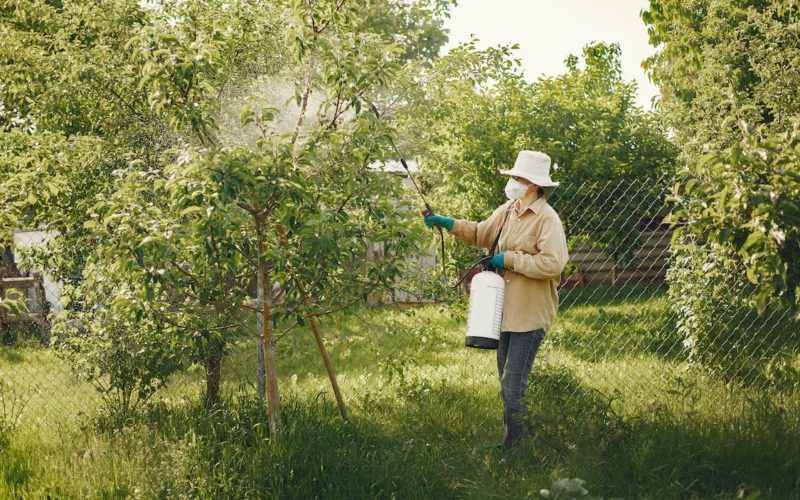When it comes to protecting our health, we often think about what we eat and how much we exercise. But did you know that the air you breathe and the products you use in your home could be harming your health?
Many common household items contain toxins that can impact our health in a variety of ways, from causing respiratory problems to increasing our risk of cancer. In this article, we’ll explore some of the surprising health risks lurking in your home and provide tips on how to protect yourself and your loved ones.
So, let’s get started!
Roundup Weed Killer
Roundup weed killer is a common household product used to kill weeds and unwanted plants. However, many people are unaware of the potential health risks associated with its use. Glyphosate, the main active ingredient in Roundup, has been linked to cancer and other health problems in humans.
According to a study conducted by the University of Washington, the use of glyphosate-based herbicides increases the risk of non-Hodgkin lymphoma by 41 percent. The study, which was published in the scientific journal Mutation Research, states that an analysis of human epidemiological studies provides strong evidence of a link between exposure to glyphosate-based herbicides and an increased risk for non-Hodgkin lymphoma.
In addition to its potential health risks, Roundup can also harm the environment. The chemical can leach into the soil and water, impacting local wildlife and ecosystems. As a result, many countries and cities have banned or restricted the use of glyphosate.
To protect yourself and your family from the potential health risks of Roundup weed killer, consider using natural alternatives to control weeds in your yard. You can also choose organic foods and look for products that are labeled as glyphosate-free. By taking these steps, you can help reduce your exposure to this common household toxin.
If you are considering filing a Roundup lawsuit, you may be wondering which law firm to turn to for legal representation. One option that you may come across is TorHoerman Law, which is known for handling Roundup cases, among other types of mass torts.
One of the reasons why TorHoerman Law may be a good choice for those seeking legal representation in a Roundup lawsuit is their experience in this area. The firm has been involved in Roundup litigation for years and has a team of attorneys who are well-versed in the science and legal issues surrounding this controversial herbicide.
While it’s crucial to keep in mind that no law firm can guarantee a particular outcome in a Roundup case or any other legal matter, TorHoerman Law may be a viable option for those seeking experienced and resourceful legal representation in a Roundup lawsuit.
Everyday Toxins Hiding in Your Home
Did you know that there are everyday toxins hiding in your home that could be harming your health? Many household products contain chemicals that can cause a range of health problems, from skin irritation to cancer. Here are just a few examples of the hidden enemies that could be lurking in your home.
- Cleaning Products: Many cleaning products contain harsh chemicals like bleach and ammonia, which can irritate the skin, eyes, and respiratory system. Some cleaning products may also contain carcinogens, which are chemicals that can cause cancer.
- Plastics: Plastic products, such as food storage containers and water bottles, may contain bisphenol A (BPA) or other chemicals that can leach into your food or drink.
- Air Fresheners: Many air fresheners contain chemicals that can irritate the lungs and cause respiratory problems.
The public debate around the safety of air fresheners was fueled by a study conducted by the National Resource Defense Council (NRDC). The study examined 14 air fresheners sold at a Walgreens drug store and found that they contained chemicals that may lead to developmental and reproductive issues, particularly for infants. The NRDC study prompted further discussions about the potential risks associated with the use of air fresheners.
How Indoor Air Quality Impacts Your Health
The quality of the air inside your home can have a significant impact on your health. Poor indoor air quality can cause a range of health problems, from minor irritations to more serious issues like asthma and lung cancer. Here are a few ways that indoor air quality can affect your health:
- Respiratory Problems: Poor indoor air quality can irritate the lungs and cause respiratory problems like coughing, wheezing, and shortness of breath.
- Headaches and Fatigue: Exposure to certain chemicals found in household products and building materials can cause headaches, fatigue, and dizziness.
- Cancer: Exposure to certain chemicals found in indoor air pollution, such as formaldehyde and benzene, may increase the risk of cancer.
- Pregnancy and Infants: Poor indoor air quality can also have negative effects on pregnancy and infant health. Exposure to certain chemicals during pregnancy may increase the risk of complications like preterm birth and low birth weight.
According to the Environmental Protection Agency’s Office of Research and Development’s “Total Exposure Assessment Methodology (TEAM) Study”, indoor air quality can greatly affect your health. The study revealed that a variety of typical organic pollutants were present at levels 2 to 5 times higher inside homes than outdoors, regardless of the homes’ location. This reinforces the importance of paying attention to indoor air quality as it can lead to a range of health issues.
The Health Risks of Mold and Moisture in Your Home
Mold and moisture can be found in many areas of a home, including bathrooms, kitchens, and basements. When left untreated, these conditions can lead to the growth of mold, which can cause a wide range of health problems. Exposure to mold can cause symptoms such as coughing, wheezing, and skin irritation and can even lead to more serious issues such as asthma.
Mold and moisture are especially problematic for individuals with weakened immune systems or respiratory issues. In some cases, exposure to mold can lead to more serious conditions, such as lung infections or allergic reactions. Also, mold can negatively impact a home’s structural integrity, leading to costly repairs.
Preventing mold and moisture in the home is key to protecting your health and preserving the integrity of your property. Regularly cleaning and maintaining areas prone to moisture, such as bathrooms and basements, can help prevent mold growth. Ensuring proper ventilation and moisture control in these areas can also help reduce mold growth risk.
If you suspect mold or moisture in your home, it’s important to address the issue promptly. This may involve hiring a professional to inspect and assess the problem’s extent and recommend appropriate remediation measures. By taking these steps, you can help to ensure that your home is a healthy and safe environment for you and your family.
Conclusion
It’s easy to overlook the hidden enemies lurking in your home. From toxic cleaning products to indoor air pollutants and mold, the health risks associated with these hazards are serious and can have long-term consequences.
By being proactive and taking action to mitigate these risks, you can ensure a safe and healthy living environment for you and your loved ones. Don’t let hidden enemies compromise your health – take action today to address these surprising health risks lurking in your home.










